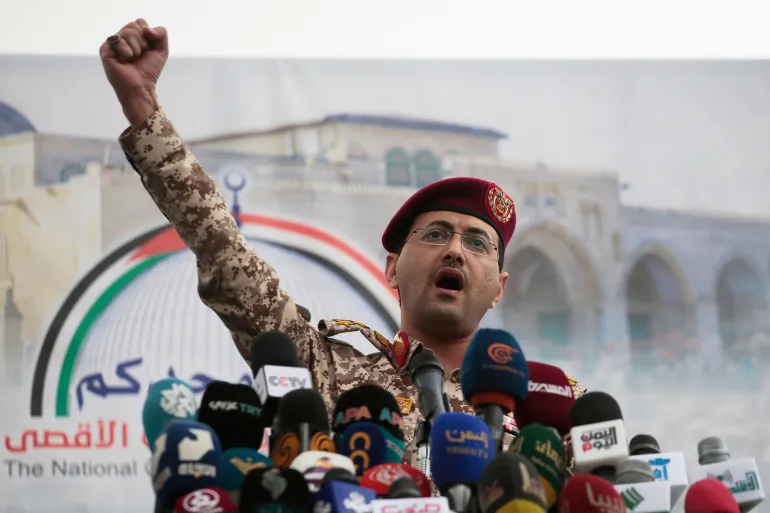
Wafric News – June 20, 2025
As the confrontation between Israel and Iran intensifies, Yemen’s Houthi movement—long viewed as a key player in the so-called "Axis of Resistance"—says it is deepening coordination with Tehran and preparing for potential escalation.
The Houthis, formally known as Ansar Allah, have claimed that recent missile attacks targeting Israel were launched in tandem with Iran's military response to Israeli airstrikes. The group has been launching drones and ballistic missiles since 2023 in solidarity with Palestinians in Gaza. Now, their operations are reportedly evolving to include direct support for Iran.
“Recent actions are in response to Israeli aggression and in defense of both Palestinian and Iranian peoples,” said Yahya Saree, the Houthi military spokesperson, via Telegram. He added that operations were being closely coordinated with Iran's military.
In a televised speech on Sunday—just two days after Israel's June 13 strike on Iran—Saree announced that Houthi forces had launched ballistic missiles toward the Israeli city of Jaffa.
Strategic Coordination
Analysts and pro-Houthi commentators suggest these attacks are deliberately timed. “They are coordinating to maximize psychological pressure,” said Yemeni analyst Hussain Albukhaiti. “When Iran strikes, the Houthis follow—keeping Israeli civilians constantly on edge.”
Although many of the Houthi projectiles have been intercepted, an early May strike on Ben Gurion Airport injured six people and temporarily grounded flights, underscoring the group's growing reach and disruptive potential.
Military experts warn the cumulative effect of these attacks forces Israel to distribute its air defenses more broadly—stretching its capacity to focus on Iran. “The threat from the south weakens Israel’s ability to concentrate against Iran,” said Nicholas Brumfield, a specialist in Yemeni affairs.
Red Sea Flashpoint
Beyond Israeli targets, the Houthis have also disrupted commercial shipping in the Red Sea. Attacks on vessels began in November 2023, with the group claiming it was targeting ships with alleged ties to Israel.
Though a tentative agreement with the United States in May paused Houthi-led strikes, the rebels have warned that any U.S. involvement in military operations against Iran would nullify the deal.
“We will cancel any agreement with Washington if it joins Israel’s war on Iran,” Albukhaiti declared, reinforcing that Iran remains a vital ally to the Houthis. He also referenced the 2018 collapse of the Iran nuclear deal under former U.S. President Donald Trump, accusing the U.S. of acting in Israel’s interests.
Analysts believe the Houthis could revive attacks on Red Sea shipping lanes or even deploy sea mines—low-tech but potentially devastating tools that could choke global trade.
Risks to Gulf States and U.S. Assets
The potential for escalation extends far beyond Yemen’s borders. The Houthis have previously clashed with Saudi Arabia and the United Arab Emirates, and they’ve openly threatened U.S. military bases in the region.
“The Houthis are recovering from recent U.S. airstrikes but could reengage if they perceive a broader regional conflict,” said Brumfield. “This includes possible strikes on U.S. bases or Gulf countries seen as part of the anti-Iran coalition.”
Though Saudi Arabia ended its military campaign in Yemen in 2022, no formal peace has been established. The Kingdom, once a primary target of Houthi missile and drone strikes, has since pursued quieter diplomacy. But that detente may not hold.
“If the hardliners among the Houthis take control, Saudi Arabia could once again find itself in their crosshairs,” Brumfield noted, while also pointing out that Saudi Arabia has in recent years provided some diplomatic space for the group.
Domestic Fallout
While Houthis focus on external coordination, internal opposition within Yemen may also be eyeing an opportunity. With Iran facing increasing pressure, rival Yemeni factions are watching closely, hoping any instability can be turned into territorial gains.
“The Houthis are currently only capable of symbolic attacks, but these could trigger a renewed international military response,” said Raiman Al-Hamdani, an independent analyst.
Yet anti-Houthi groups remain fragmented and lack the capacity to govern reclaimed areas effectively. Albukhaiti warned that any internal challenge would be met with a fierce response—potentially targeting oil infrastructure, airports, and desalination plants in states backing opposition forces, such as Saudi Arabia and the UAE.
A Fragile Balance
Despite efforts to present themselves as part of a broader resistance movement, the Houthis remain in a precarious position—juggling their allegiance to Iran, domestic legitimacy, and regional threats. With the specter of full-scale war looming, their next steps could shape not only the future of Yemen but the stability of the entire Gulf region.
WafricNews will continue to track this developing story.
By WafricNews Desk.
By WafricNews Desk.


Comment
To post a comment, you have to login first
LoginNo Comments Yet...